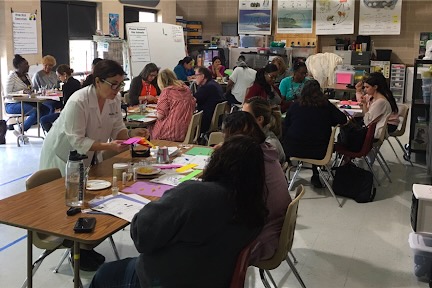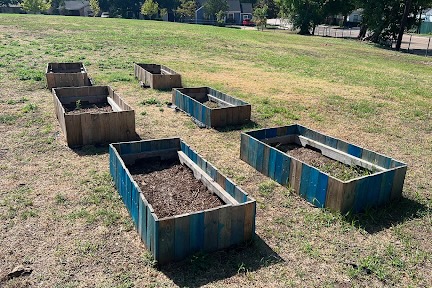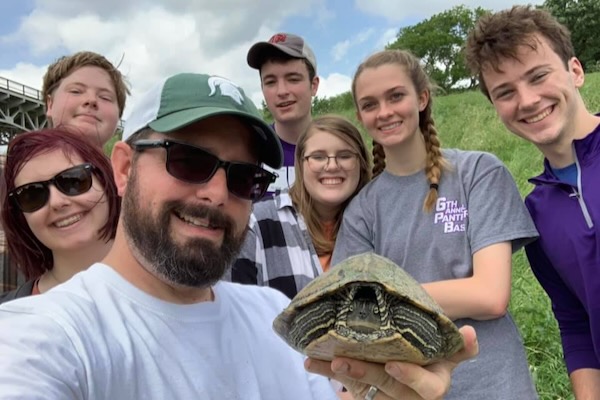
A baby river cooter was counted as part of the Trinity River Turtle Survey conducted by Paschal High School students in Fort Worth. Photo courtesy of Andrew Brinker.
Nov. 17, 2023
We wanted to know what North Texas students are learning about with regard to environmental issues so we contacted two of the largest school districts in the area.
According to their spokespersons, Dallas Independent School District and Fort Worth Independent School District remain diligent in environmental education and conservation across multiple campuses. In these North Texas school districts, environmental education is provided both inside and outside the classroom.
DALLAS ISD
In DISD, environmental lessons begin in the early years.
“In elementary and middle school level, they teach kids about conservation. So, how to conserve water,” Mark Broughton, director of STEM education at DISD explained.
This education does not just stay indoors, as teachers encourage students to be eco-friendly at home.
“Teachers have kids compare how much water they use if they take a shower versus a bath,” said Brouhton.
Among grade levels, various environmental courses are offered as well. At the high school level, students are required to take biology, which Broughton explained has aspects of environmental education. Environmental Systems is also taught at the upper levels and focuses on the environment throughout the duration of the school year.
 A STEM class at Dallas ISD. Courtesy of Dallas ISD.
A STEM class at Dallas ISD. Courtesy of Dallas ISD.
Other courses include Earth and Space Science, with a focus on both space one half of the year and the Earth and its ecosystems the other half.
Aquatic Science, is also a class offered at the high school level in DISD schools. These classes focus on the ecosystems in the water. Both students and teachers learn about the importance of aquatic life and water quality.
“Sometimes we have chemistry teachers come out to our center to do water quality testing,” Broughton explained and described how these tests include PH balance, temperature and oxygen.
DISD has also made strides to implement environmental education outside the primary core curriculum, with school gardens also common in the district. With between 175-200 gardens in various states of use, these promote lessons in preservation, water conservation and healthy eating.
 Garden boxes ready for planting at Arturo Salazar Elementary in Dallas ISD.
Garden boxes ready for planting at Arturo Salazar Elementary in Dallas ISD.
With gardening, schools also promote composting and recycling. Trash and plastic thrown away in the cafeterias in some schools are taken to school gardens for compost while plastic water bottles are recycled throughout the classrooms.
As a district, DISD has made strides to push toward eco-friendly initiatives. This year, DISD will be getting 25 electric school buses as part of the Environmental Protection Agency’s clean bus program.
FORT WORTH ISD
FWISD also implements environmental initiatives in the classroom.
“You mainly see these environmental education things happening in our third, fourth and fifth-grade curriculum,” Kenyail Carr, director of K-12 Math and Science at FWISD, explained.
“[In third grade, students learn] to describe environmental changes such as floods and droughts, where some organisms thrive and others perish or move to new locations.”
In fourth grade, students learn to classify certain resources as renewable and nonrenewable.
In fifth grade, students are introduced to the formation of fossil fuels and learn to predict the effect of changes in ecosystems.
“As we move to middle school, they start to get into that tighter order thinking. They start researching. They discuss the advantages and disadvantages of using things like oil, or natural gas, nuclear power, solar resources, things like that.” Carr continued.
In FWISD, middle school environmental education is research-focused. Sixth graders begin to learn and research the positive and negative impacts of using coal, oil, natural gas, nuclear power and other resources on the environment.
In seventh grade, students analyze the effects of weather, erosions and deposition on the environment in Texas. While in eighth grade, students begin to research and understand long and short-term environmental changes and how they impact organisms and populations in the future.

Paschal High School science teacher Andrew Brinker and his students show off a turtle they inspected during a survey in Fort Worth. Photo courtesy of Andrew Brinker.
In high school, a variety of environmental courses are offered. Similar to DISD, FWISD offers aquatic science, biology, chemistry, earth and space science and environmental systems.
Paschal High School science teacher Andrew Brinker won the 2020 Environmental Educator of the Year Award from TCEQ for enlisting his students to conduct the Trinity River Turtle Survey, a three-year survey of resident turtles in the Trinity River in Fort Worth to provide a baseline for future studies.
School gardens have also been built across FWISD.
Waverly Park Elementary, which was awarded a grant last year to build a community garden, hosted their Garden Day on Sept. 16. This event called for volunteers to aid in building a Texas native pollinator garden and a raised vegetable garden for the students, staff and community at Waverly Park Elementary School.
Wavery Park Elementary isn’t the only FWISD school implementing school gardens as a form of environmental education. Morningside Elementary recently had their gardens brought back to life, thanks to the help of the community.
CITY OF DALLAS
While schools are often the first place North Texas youths are taught environmental education, other organizations and initiatives exist to aid students in their educational journey. Dallas Environmental Educational Initiative, is an environmental education program that teaches water conservation education to people of all ages in the Dallas area.
Founded in 2006, Dallas EEI promotes various forms of environmental education throughout the Metroplex from ‘Museums on Wheels’ for middle school classes, to hands-on water conservation lessons at the elementary school level. Through the program, schools are able to contact Dallas EEI and invite certified teachers from the program to teach hands-on lessons about water conservation to elementary school classes. This is all done for free.
Are you an environmental school teacher in North Texas? We'd like to hear from you. Email Julie@GreenSourceDFW.org.
RELATED ARTICLES
Teens learn about Dallas water system in city program
Fort Worth students survey turtles along Trinity River
Stay up to date on everything green in North Texas, including the latest news and events! Sign up for the weekly Green Source DFW Newsletter! Follow us on Facebook,Twitter and Instagram. Also check out our podcast The Texas Green Report, available on your favorite podcast app.









